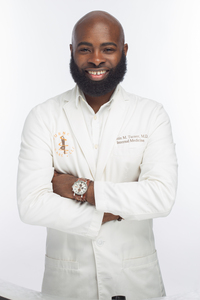Dr. Turner is an internal medicine physician. He is from Mississippi and went to college here. He went to medical school out of state and returned to the University of Mississippi Medical Center to complete residency. Today, he runs a private practice in Jackson. For Dr. Turner, the pandemic at first felt kind of good. He readied himself for the impending crisis and he felt, “This is not just what we are going to do, it is who we are.” He describes a cautious, but palpable optimism. He recalls, “There was a sense of getting ready for battle together.”
However, in mid-March, as the first cases began to occur in Mississippi, his initial optimism turned to disappointment, even distress. Before there were reliable treatments or vaccines, Dr. Turner noticed the insidious onset of misinformation. In social media circles and among his respected friends, people began to question whether physicians were telling the truth or whether we had been financially influenced by the pharmaceutical companies. Conspiracies grew and evolved. Attempts to find common ground were met with backlash and mistrust. Dr. Turner watched the development of a new challenge. His patients were making their decisions based on opinion and misconceptions. For COVID, the choices made could mean life or death.
Faced with mistrust, Dr. Turner admits he needed to step back. His initial response was frustration and anger, which ultimately turned to self-doubt. As he reflected, he realized the importance of returning to basic questions of being a physician. He asked of himself, “How am I educating my patients? How are they getting health information?” He focused on finding the truth for those under his care.
Dr. Turner considered his own identity and wellness as a physician during this crisis. He shares that he ultimately got a therapist. His therapist helped him navigate the complex ways we deal with things out of our own control. Therapy helped him identify how to be part of a solution. This is a crucial and important part of this story. Dr. Turner notes, “If you don’t surround yourself with the proper resources, it’s easy to get overwhelmed.” As it turns out, seeking help and getting a therapist was an essential step for the development of the coalition. With a fresh look at the problem, opportunities for change began to appear.
Taking the time to pause and reflect helped him remember he had leadership experience that could be utilized. Years prior to the pandemic, when Dr. Turner returned to Mississippi, he became involved with events in the medical community. It was then that he first experienced working with medical leaders, public health, churches, and legislation. He helped with free health events at the Metrocenter mall. Dr. Turner understood the positive impact of a group of people armed with truth and time. This would be the framework that would galvanize his next steps.
Dr. Turner first focused on his own patients by combating conspiracies and dispelling myths. And it worked. After focusing on his patients with a truthful, honest, and non-judgmental approach, he saw positive change. More and more people chose to be vaccinated. He remembers one patient who told him, “I’m waiting until I can speak with Dr. Turner!” After facing misinformation at his own clinic, he looked outward to his community. He saw that there was hesitation at a state level to implement a state-wide mask mandate. Unfazed, Dr. Turner was able to effect change at a city level by bridging the disconnect between science and public leaders. Jackson was one of the earliest cities in Mississippi to have a city-wide mask mandate.
As the pandemic raged on, he moved quickly forward and expanded his efforts. Dr. Turner led the development of an area coalition composed of legislators, churches, and members of the Mississippi State Medical Association. Speaking at churches, barbershops, and town halls, the initial goal was an information campaign. They conducted surveys to determine current level of trust and source for truthful health information. The results of the survey they conducted were profound. While patients considered their physician to be the most trusted source for health information, many didn’t have a primary care physician.
With insight into how people felt about the pandemic and how willing they were to accept information, the coalition set up sessions, radio and television interviews, and podcasts to reach as many people as quickly as possible. They created a space for dialogue, not a lecture or forced information campaign. All in all, over 500 sessions were held. From 3 to 5 interviews a week were done. Dr. Turner remembers, “It was work, but I had to do it. I couldn’t stop. It felt like a calling.” He shares that it was critically important to not intimidate people, and to help them not be afraid. He quickly saw that a lot of the people weren’t anti-vaccination. Instead, a majority were simply cautious. He notes, “The survey helped us figure out how to reach out and communicate with people that were cautious but connected.”
What began as an idea, turned into a clinic project, grew into a community involvement, and ultimately a coalition. Dr. Turner’s drive and search for the truth undoubtedly saved lives, lives of people who can look back at the last two years and thankfully turn around to look forward for what’s to come.


